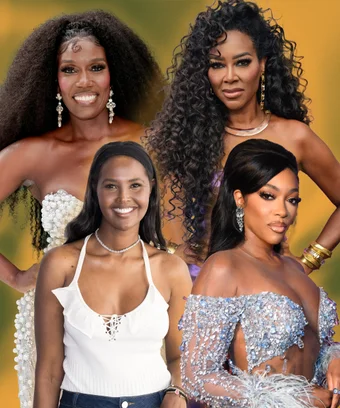Content warning: This article discusses pregnancy loss, surgery, fertility struggles, and the Black maternal health crisis.
When I was lying in my hospital bed recovering from fibroid removal surgery, I turned to what many would dismiss as frivolous entertainment: The Real Housewives franchise. Little did I expect that this guilty pleasure—often labeled as mindless reality TV—would become a surprising source of comfort and insight during one of the most difficult chapters of my life.
Bozoma Saint John, the dynamic Ghanaian-American entrepreneur on The Real Housewives of Beverly Hills, shared a raw and vulnerable narrative about her own fibroid battle and pregnancy loss in the latest season. Watching her discuss the fear of surgery, the necessity of removing fibroids to conceive in her late 40s, and the emotional weight of her past miscarriages, struck a chord. Yet, amidst Boz’s health struggles, the show quickly drifted back to the familiar whirlwind of marital drama, friendship feuds, and luxury lifestyles—often sidelining the critical conversation about Black maternal health.
This pattern, however, isn’t unique to Beverly Hills. Across the Real Housewives franchises—from New York to Potomac and Atlanta—Black women have candidly shared their own painful journeys with fibroids, fertility issues, IVF, miscarriages, and hysterectomies. Ubah Hassan on RHONY described her agonizing periods caused by fibroids and the daunting decision to see specialists late in life. On Real Housewives of Potomac, Candiace Dillard Bassett vulnerably chronicled her IVF battles. Cynthia Bailey and Kenya Moore from Real Housewives of Atlanta opened up about the challenges of fibroids and fertility struggles well into their 40s, while Olympian-turned-castmate Sanya Richards-Ross revealed her heartbreaking miscarriage experience.
For those unfamiliar, The Real Housewives is a sprawling reality TV franchise following the often chaotic lives of wealthy women across the United States and beyond. It’s a global phenomenon, notorious for its mix of scandal, opulence, and emotional outbursts. Yet, beneath the “trash TV” veneer lies moments of genuine human struggle and resilience. The cast members have supported each other through addiction, cancer, abuse, and yes—maternal health battles. For me, as someone facing chronic health issues related to fibroids and anemia, this representation was unexpectedly powerful. It sparked conversations about Black women’s maternal health—a topic too often ignored or misunderstood.
Fibroids are particularly common among Black women—up to 80% worldwide suffer from them at some point. These benign tumors can cause heavy bleeding, miscarriages, fertility challenges, and complications during pregnancy. Yet, research barely scratches the surface in explaining why Black women are disproportionately affected. This disparity mirrors the broader, troubling reality of Black maternal health outcomes globally. In the United States, Black women face a maternal mortality rate three times higher than white women. In the UK, Black women are four times more likely to die during childbirth. Systemic racism, implicit biases in healthcare, and the dismissal of Black women’s pain contribute to these alarming statistics.
It’s in this context that the candid conversations from Real Housewives women become crucial. Porsha Williams from Real Housewives of Atlanta opened up about her miscarriage and how her pain was repeatedly ignored by doctors, exemplifying the deeply rooted medical racism that Black women endure. “Doctors feel like Black women have a higher pain threshold,” she shared, linking her miscarriage to stress caused by fibroids—a reality many women silently endure.
Despite being caricatured as loud or “dramatic,” these Black women’s willingness to reveal intimate parts of their lives fosters awareness and destigmatizes maternal health struggles in Black communities. Their stories are not just entertainment; they’re lifelines for many viewers who see themselves reflected in these narratives.
This kind of storytelling reminds me that a TV show doesn’t need to be highbrow or critically acclaimed to provoke meaningful dialogue. Reality TV, often dismissed as low culture, can push forward vital social issues—sometimes better than traditional media. Shows like Real Housewives reach millions of viewers weekly, many of whom are Black women grappling with similar health issues. Campaigns by organizations like Black Mamas Matter and FiveXMore highlight the urgency of these conversations, and popular media can be an unexpected but effective ally in this fight.
Of course, the cast members live lives of wealth and privilege, which means their access to healthcare is far easier than for the average Black woman. Yet, when it comes to navigating systemic biases in medical settings, their experiences resonate deeply. The frustration, the fear, the fight to be heard—it’s something that transcends income or geography.
I’m aware that reality TV is often scripted or manipulated, and these shows don’t always portray life authentically. But real life seeps through. The emotional toll of motherhood, the complexity of friendships and marriages, and the lived experience of Black womanhood can’t be completely fabricated. For me, at a time when I was isolated and in pain, these stories made me feel less alone.
In a world where Black maternal health remains a crisis, any platform that raises awareness—whether through highbrow drama or reality TV spectacle—deserves recognition. As I continue my journey toward healing, I’ll keep tuning in, finding solace in the unexpected way The Real Housewives have helped shine a light on stories that too often go unseen.




